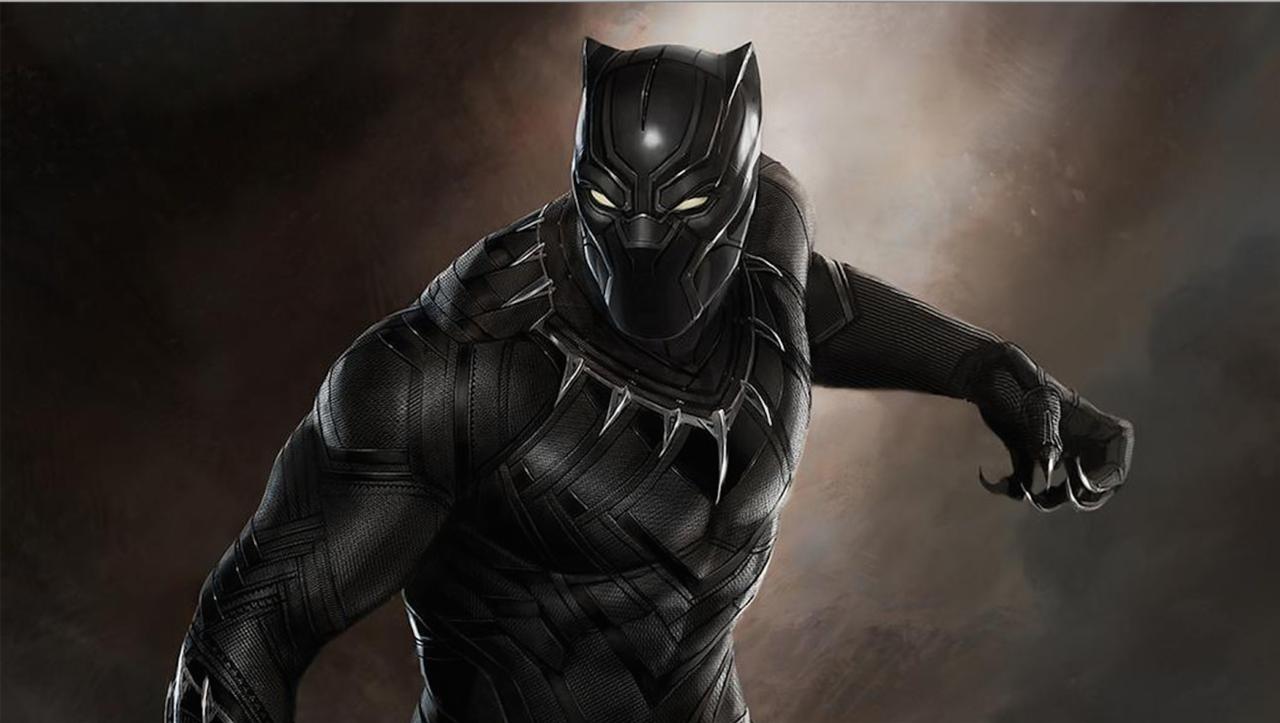
Who can deny the magnetic draw towards all the big screens of the world as arguably the most anticipated film ever in the history of Hollywood makes its way to a cinema near you. Not only is Black Panther smashing all kinds of records at the box office, but it appears set to be the centre of a seismic cultural shift in the Superhero/Sci-fi genre in particular and Hollywood in general.
The excitement has been steadily rising to fever pitch ever since the trailer dropped in the summer/Autumn of 2017. With a reported “90% Black cast” (1), Black Panther is probably the highest profile and certainly the most expensive film to boast such credentials. Personally, anyone of the names Luptia Nyongo, Chadwick Boseman, Angela Basset, Danai Gurira & Forest Whittaker (to name just a few) is enough to peak my interest in a flick. But putting them ALL TOGETHER – in ONE FILM; The Avenger’s aint got NUTTIN on this Assembly.
With Ryan Coogler as writer/director and Kendrick Lamar curating the sound track, it would seem this entire effort has brought to bear the finest array of Black talent you will find anywhere in front of and behind the camera. Black excellence of the highest order is always worthy of recognition and even without seeing the film, congratulations are due.
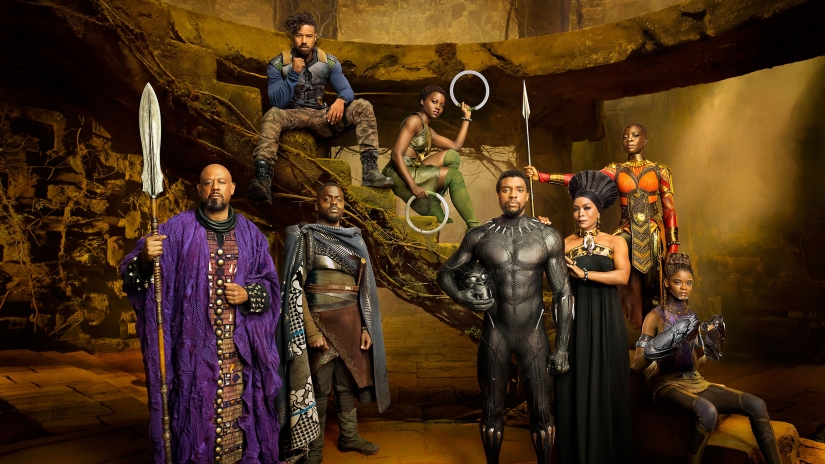
In some ways, the most important factor feeding in to the preemptive success of Black Panther is the political/social climate it has come in. Consistent news worthy prominence of Black issues has created an environment that calls for heightened, varied and multifaceted reflections of Blackness through all creative outlets. A fact which no doubt informed Marvel & Disney’s production & promotional strategy; and a fact which also indicates that it would be unwise to make celebration our only activity at this moment, especially seen as the current climate is merely a mirror of the climate in which Black Panther was first created. With so much psychological, spiritual, emotional and financial investment the film staring Marvel’s first Black Hero, it may be beneficial to look at the significance of Black heroes in the hearts and mind of Black people, the purpose they serve and why they appear so important to us. Let’s lay the foundation – Sankofa with me if you will.
This is a “Cold War”….
Black Panther was first brought to us in Comic Book form in July 1966. A pivotal period in that it was the same year that the phrase “Black Power” began to define a movement; the same year that the Black Panther Party for self Defence was founded; and the same year that the celebration of Kwanzaa was initiated. We will get more in to that in part 2 but for now, we highlight these facts just emphasise that this is the very height of the Civil Rights, Black Power & Afrikan Cultural/Nationalist Movement.
NB: It’s about to seemingly veer off course for a sec, but stick with it. It will all make sense – promise.
At this time America was wrapped up in the so-called “Cold War” – that period roughly from 1947 (the conclusion of Mass European War II (or ‘World War II’ for the politically Eurocentric) where the USA, Britain & France were in a monumental not-quite-military standoff with Russia (or more properly the Soviet Union) & the Eastern Bloc (East Germany, Italy and a number of other nations in central & eastern Europe, eventually joined by China). The buzz term was “COMMUNISM”, which as the US government would tell it, was basically the “TERRORISM” of its day. The Western world flooded its citizens with images and narratives of unrepentant tyrannical dictators who wanted nothing more than brutalise the people of planet Earth as a part of the programme of world domination.
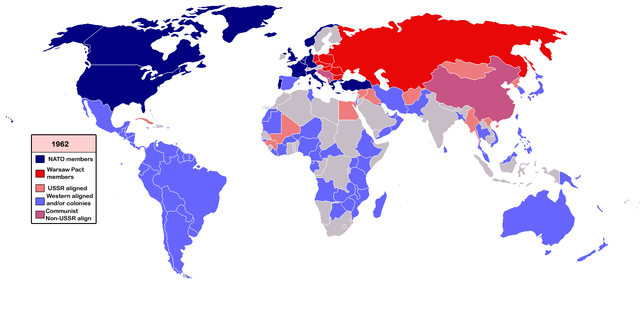
This is the era that ushered in the birth of the Nuclear Deterrent, the Arms Race, the Space Race, unprecedented propaganda warfare, economic and political espionage and increased power and influence of intelligence agencies such as the CIA and the KGB.
Once Winston Churchill had declared the “iron Curtain across Europe” (2), a dejected and war weary British Government effectively passed the baton to its children in America, making the US the pre-eminent military intervener of the white world, spreading “freedom” & “democracy” in the form of what became known as the “Truman Doctrine”, initiated by then then president Harry S. Truman. “Freedom” in this context was America’s gift to all who might come under the threat or influence of the Soviet Union & Communism – as Truman explained;
“One way of life is based upon the will of the majority, and is distinguished by free institutions, representative government, free elections, guarantees of individual liberty, freedom of speech and religion, and freedom from political oppression.”
“The second way of life is based upon the will of a minority forcibly imposed upon the majority. It relies upon terror and oppression, a controlled press and radio; fixed elections, and the suppression of personal freedoms.”
And the intended remedy was;
“I believe that it must be the policy of the United States to support free peoples who are resisting attempted subjugation by armed minorities or by outside pressures.
I believe that we must assist free peoples to work out their own destinies in their own way.
I believe that our help should be primarily through economic and financial aid which is essential to economic stability and orderly political processes.” (3)
Basically same propaganda that successive American Governments have recycled to this day. While our parents & (great) Grand Parents were being lured over to the UK to help rebuild the “mother country”, the USA was establishing its military and economic influence in the world.
As previously mentioned one of the primary fronts for the Cold War was the Space Race, in which Russia and America would compete over who can reach the moon first. Russia beat America to the punch initially by launching the satellite Sputnik 1, then Vostok 1, the craft carrying the first human in space. As we are all now famously aware as a result of the award winning film “Hidden Figures”, these events inspired NASA to elicit the Genius a number of Black Women as Cold War scientific combatants on behalf the USA. Though names of these women would be condemned to relative obscurity until recently, hype around the Space and moon landing attempts was a fact of everyday life for the average America who were saturated by its events through the news media.
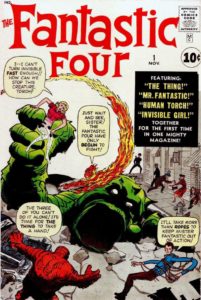
At the same time as all this was going on, a comic book creator named Stan Lee was trying to devise a way to save his failing company. His answer was to create the Fantastic Four, the first Super Hero family in history. He and colleague Jack Kirby would from then on become the duo that forever change the face of comic book entertainment.
ENTER THE FANTASTIC FOUR! Simply a very imaginative example of “fake it till you make it”. An alternate universe in which Reed Richards – a genius level Aerospace Scientist, Benn Grim – a Pilot and 2 non-essential siblings named Susan & Johnathan Storm get their super powers “after deciding to make an unauthorized test flight into space using an experimental rocket of his [Reeds] own design… Once in space, the rocket was bombarded by a wave of cosmic radiation.” (5) Ingenious popular culture fuel to the psyche of a population already gripped by the suspense of the Space Race.
In case the allegory missed anyone, Lee & Kirby put it directly in your face in Fantastic Four #1- as funding issues threaten to jeopardize the mission, Susan Storm throws on some of that old lady-like encouragement to spur the men into action:
“Ben, we’ve got to take the chance… unless we want the commies to beat us to it.” (emphasis added)
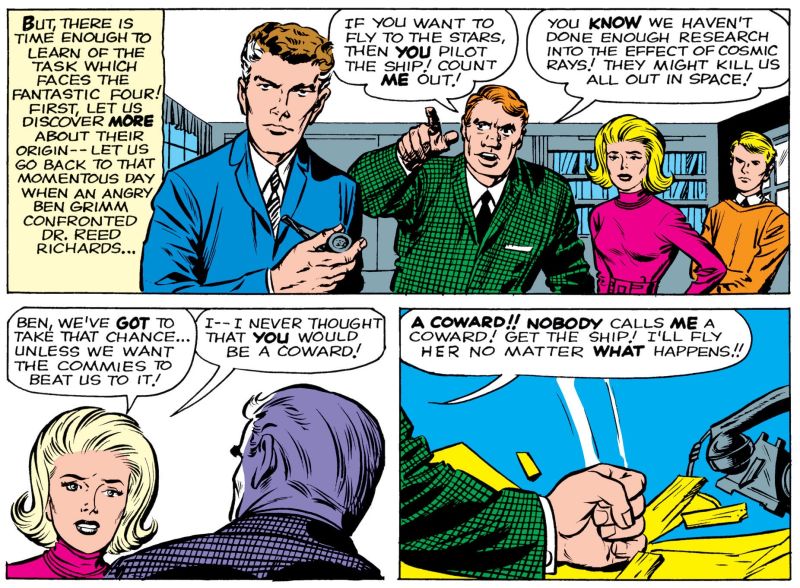
The Fantastic Four were little more than Cold War scientific combatants inspired by a deep sense of patriotism. Just like Captain America sparking Hitler in the Jaw or Iron Man duelling with The Mandarin (The joke ting they put in Iron Man 3 was a monumental swerve from the original Mandarin, a terrorist that represented the threat of China, Japan and other “Yellow Peril” nations) or American Atomic Scientist Bruce Banner becoming exposed to radiation while working on the Gamma Bomb, thus becoming The Hulk or Russian villain Yuri Topolov aka The Gargoyle, a Soviet Spy attempting to steal David Banners research or… I think we get the point – The comics were saturated with WWII & Cold War allegories all resulting in triumphant Americans prevailing over their eeeeeevil commie foes.
So how does the Black Panther fit in to this?
…..You better know what you’re fighting for
Now – ever since 1492 when Columbus sailed the ocean blue, the ever present yet understated fact of every war among and between European Nations is what they are fighting over, Afrika is at the centre of it. This was true during the Anglo-French Wars that followed; This was true of the wars between Partugal & Spain in the 1500’s & 1700’s. This was true in all the wars right up until the Scramble for Afrika initiated the by Berlin Conference in 1884-5 which ushered in colonisation of Afrika; This was true throughout Mass European Wars I & II and was no less true during the 50’s and 60’s as Afrikan nations were declaring independence from European rule left right and centre. In part 2 we will explore how this affected the Liberation Movements of Afrikan people the world over. But for now, suffice to say the Soviet Union & America were falling over themselves to ensure allied-ship from the emerging ever more self-sufficient continent; both seeking territories over which they had influence and of course, access to the natural resources of the richest continent on earth.
Now at the same time as all this was going on, two comic book creators names Jack Kirby & Stan Lee were devising a way to inject more diversity in their lily white superhero universe.
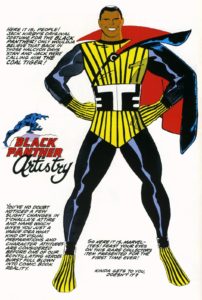
ENTER BLACK PANTHER! Oh wait, sorry, not quite… ENTER COAL TIGER! The first manifestation of the Black Panther as imagined by Jack Kirby. A random name choice? I should think not – as according to some “Coal Tiger” was apparently one of the many euphemism used in the post-colonial era to refer to Afrikan Nations. However it seems between Kirby & Lee, the name was scrapped, the character re-imaged and the Black Panther was born – introduced to us via the now top selling comic of Cold War Heroes themselves – Fantastic Four issue 52.
T’Challa, King of Wakanda, elicits the help of the super hero family to assist him in defeating his number one foe and murderer of his father – Ulysses Klaue. The comic is full of stereotypes basically encapsulated by The Thing’s and later The Human Torch’s perceptions of Afrika. For example when T’Challa sends the Fantastic Four and state of the art, technologically advanced private air craft to facilitate their trip to Wakanda, The Thing replies:
“But how does a refugee from a Tarzan movie lay his hands on this kinda gizmo?”
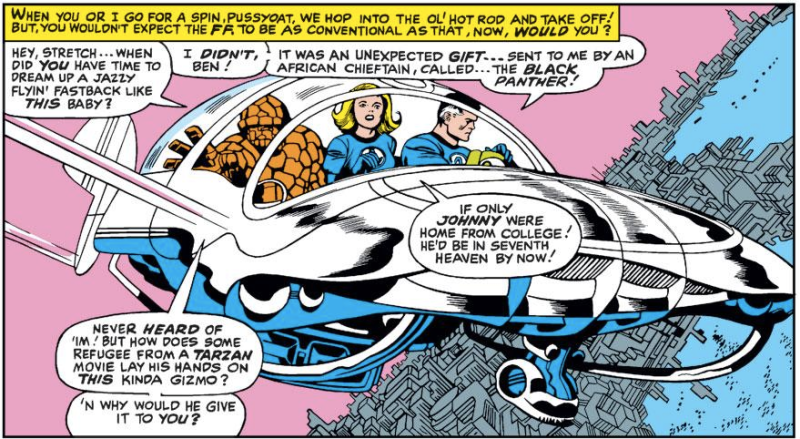
This and other statements dripping with the racism of the white world and its low perception of Afrika and Afrikans, were essentially sets up to be slapped down by the sheer magnificence of the Wakanda they come to see. For many, this was Lee & Kirby presenting white America with its own prejudice so that it could be directly challenged as Black Panther initiates a hunting game effectively capturing all four members of The Fantastic Four. The tables turn however, as their non-superhero companion Wyatt Wingfoot foils the plot and gives T’Challa a well-earned lesson in underestimating your opponents. White male supremacy thus re-established, T’Challa proceeds to befriend the Fantastic Four, informing them that he was merely trying to test himself against the best in preparation for confronting Ulysses Klaue.
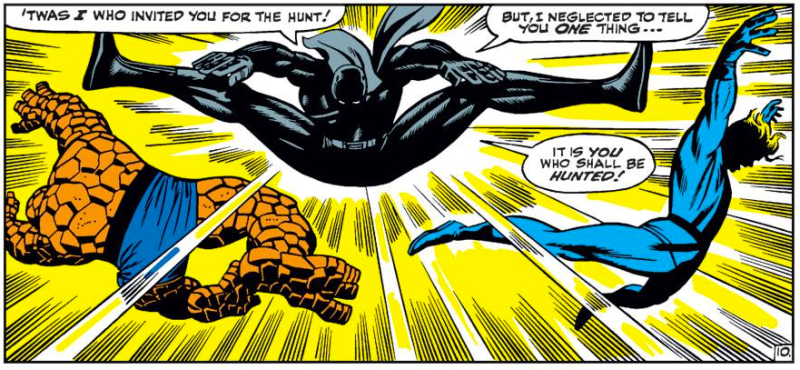
According to his most popular and consistent biographies, the villain, later to be known as Klaw is “the son of Nazi war criminal Colonel Firtz Klaue. After World War II he moved back to Belgium and later anglicized his name to ‘Klaw,’ and raised his son with tales of Wakanda”. As an adult Klaw is hired to assassinate King T’Chaka (the then Black Panther & T’Challa’s father), in the event that he refuses trade deals with some unspecified nations. His biography continues “Klaw was also there personally, as the Panther killed his great-great-great-grandfather in the 19th century while this one was trying to annex Wakanda.” (5) (Emphasis added)
So we are brought squarely to a less than subtle reference to the Afrikan Nation of the Congo, which was indeed annexed by Belgium and gifted the Belgian King Leopold II in the 19th Century. Wakanda is clearly an allegory for Congo in particular and Afrika as a whole.
During the Cold War however, Congo under the leadership of Patrice Lumumba like Ghana under the leadership of Kwame Nkrumah, were among the many Afrikan Nations who refused to take sides with either America or the Soviet Union. In an April 1960 address, Nkrumah broke it down:
“The cardinal principle upon which the peace and security of this continent depends, is the firm insistence that Africa is not an extension of Europe or of any other continent. A corollary of this principle is the resolution that, Africa is not going to become a cockpit of the cold war, or a marshalling ground for attack on either West or East, nor is it going to be an arena for fighting out the East-West conflict. In this particular sense, we face neither east nor west, we face forward.” (6)
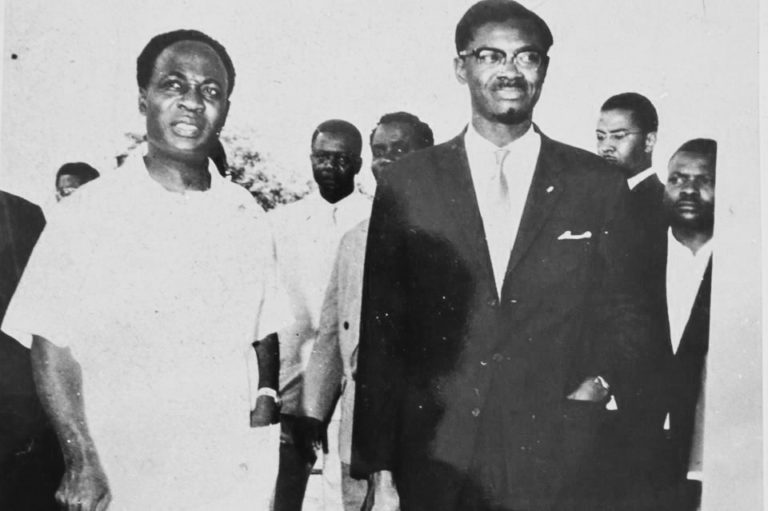
Those Afrikan countries that refused to takes sides were known as the Non-Aligned Nations and presented a thorn in the side to both East & West – especially America. It was in fact this new emergent spirit among Afrikan nations that began to shift the narrative and perceptions of Afrikans, which no doubt Lee & Kirby were responding to in the depiction of King T’Challa. The only problem was, this stubborn self-determination did not serve America’s interests.
The political stalemate was brought to bear in the comics as King T’Challa sought revenge for his father’s murder. The image of a proud, strong, mineral rich Afrikan Nation that had closed itself off from the world, but now exposes itself to a benevolent American fighting team to fend off a Son-of-a-Nazi Cold War Assassin, carries obviously political implications. This was a pro-American imagining of the desired allegiances of a liberated Afrika. Symbolically speaking – The Black Panther aligned himself with America and the Western Bloc.
Such characterisations are in fact not unlike that of the Blaxploitation era, in which protagonists like Shaft, presented all the imagery and swag of the Black Power Movement, but at the end of the day, he was a “pig” with allegiances to “the (White) Man”. Similarly, for much of his early years, T’Challa King of a whole Afrikan nation with advanced technology, moved to America to teach, thereby spending most of his time battling all the threats of the world as perceived by American eyes.
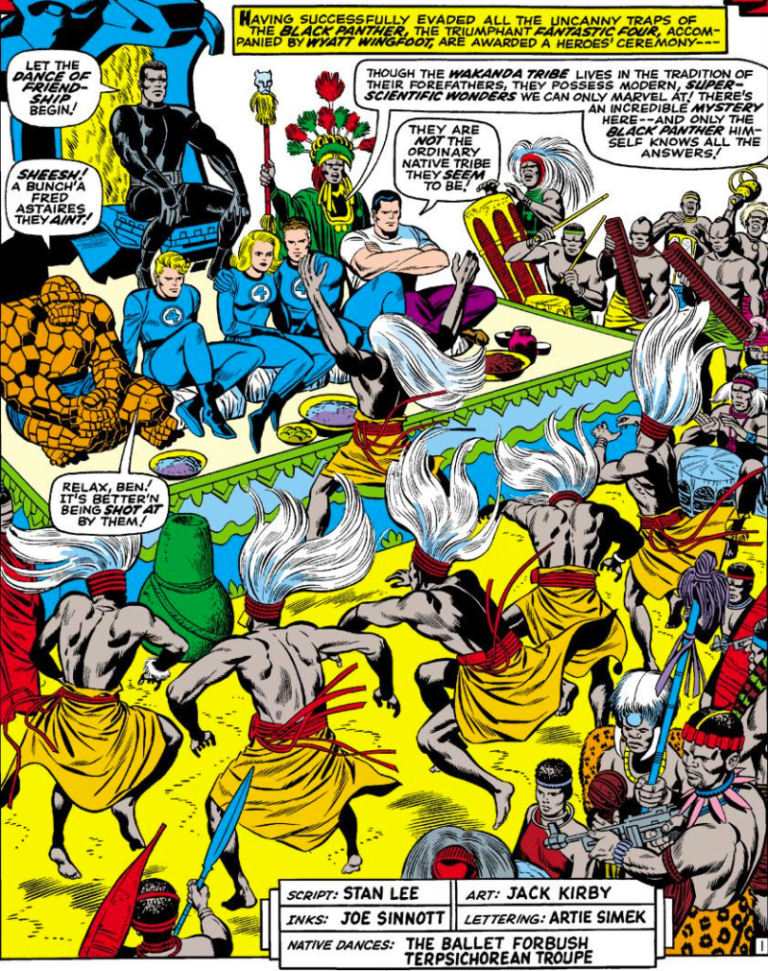
However times do change, and with social movements such as mass opposition to the Vietnam war among other social movements, Marvel content began to shift to accommodate the growing politicisation of American society. Depictions such as “The Mandarin” either faded or rebooted and shed some of their more overt racist stereotypes. The Black Panther even had story line where he went to the American south to do battle with the Ku Klux Clan.
Ever since the now celebrated run of Christopher Priest in the 90’s, Black writers have sought to add depth to the Black Panther Character and make him and the nation of Wakanda truly our own. The Marvel Universe however has continued to recycle the themes of its origin and as a result the presence of Mass European War II & Cold War context can be found in ubiquitous abundance throughout modern iterations of all the characters and storylines – from the Winter Soldier (an allegory for post-Vietnam War Crimes investigations); to Shield vs Hydra (simply replicating the American vs Russian espionage, spy and world takeover tactics prevalent in the era). In short Euro-American society from its politics, to its economics and its art and popular culture is still solving and re-solving the problems of the Cold War era.
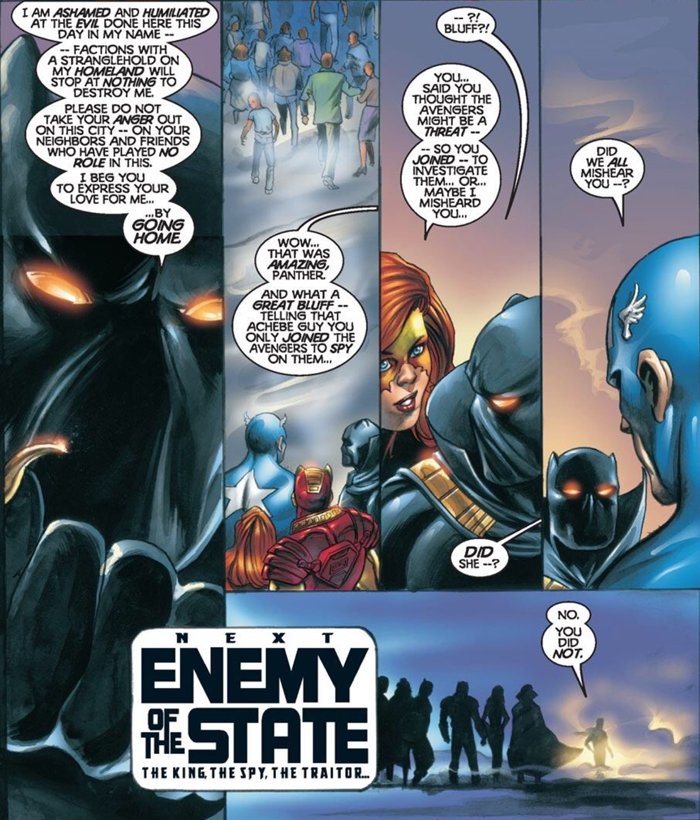
Furthermore, with both Marvel & DC coming under fire for a lack of “diversity” in their big screen empires, it appears that Black Panther today is serving a similar purpose as he did in 1966 – another Black first in a vast white Universe dominated by the politics and agendas of the white movers and shakers.
With the historical context behind the MCU so clearly defined – it does beg a myriad of questions; Are we properly honouring the Black excellence of those involved Black Panther if we allow the euphoria of this moment to become an anaesthetic? Are Black faces in a vast white universe the best that Black excellence has to offer? If not, what more do we have to offer?
What was the historical reality for the Afrikan world of the Cold War period? Where are the Black created superheroes and universes inspired by the experiences of Black people during the Black Liberation/Anti-Colonial Movement? Are we creating any superheroes committed to solving the problems of Afrika, the Caribbean and the Black World from the perspective of Afrika, the Caribbean and the Black World?
Has the Black Panther indeed become such a hero?
TUNE IN NEXT WEEK! As all this and more will be explored in Part 2.
TO BE CONTINUED…
References
- https://movieweb.com/black-panther-cast-africa-american-actors/
- https://www.winstonchurchill.org/resources/speeches/1946-1963-elder-statesman/the-sinews-of-peace/
- http://avalon.law.yale.edu/20th_century/trudoc.asp
- http://marvel.wikia.com/wiki/Fantastic_Four_(Earth-616)
- http://marvel.wikia.com/wiki/Ulysses_Klaw_(Earth-616)
- http://www.nkrumahinfobank.org/article.php?id=354&c=46

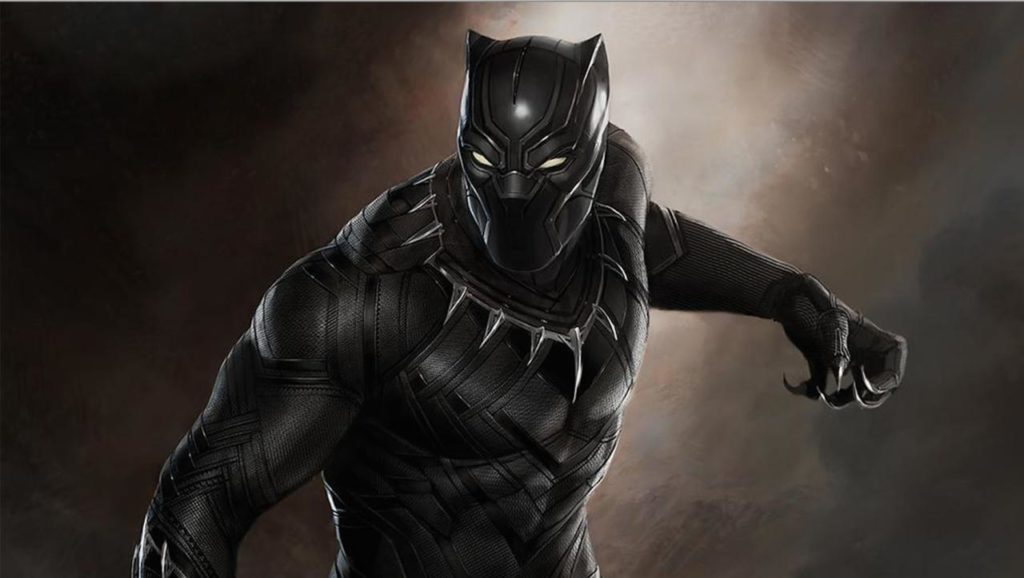
Great analysis Brother. You bring to like Dr. John Henri Clarke comment that, “All history is a current event.”
Looking forward to reading Pt. 2.
Tendai MWARI, Greetings Elder.
It’s a pleasant surprise find that you are the first to comment on this post. “From the Browder Files” is the first book I can remember reading as a child that focused on analysing media and decoding symbolism! So the fact that you have taken time to read and give feedback is very meaningful! I am humbled!
Thank you!
I would be most grateful if the language could be simplified. It was great analysis for me, I was thrilled and excited and wanted to read it to my grandson 10 years of age, who is home schooled, but it became a bit jargonistic for him. None the less well done. We all know that our imperfections create perfections.
I saved reading your analysis until I watched the film which I did yesterday. To say I was excited for your breakdown is a under statement as I know you bring knowledge to the masses. Having no previous knowledge about the origins and story of the black panther comic hero before the europhoria of the Film, I fully grateful that you have provided the historical context which is more empowering for me than the film although it was amazing i need to add. I watched it in 4d so the overall experience mind blowing for me..
From The Browser File is the first series of books I read that opened my eyes to myself and a totally new way if thinking and understanding of what we are a really dealing with. Coming from your generation I put YOU in my list of legends that give us access of type of clear, basis lnks and realizations that Browser does. The type of analysis that is necessary to keep us as a people grounded in reality. Thank you. Off to read part 2 thirsty for more.
Maybe you could do a book on your review and analysis of modern popular culture as it would serve as a must read for my children and others in years to come ( those not ready for this level of analysis right now but maybe in a few yrs of so) as did Browsers series for you and I. 👌🏾👊🏾